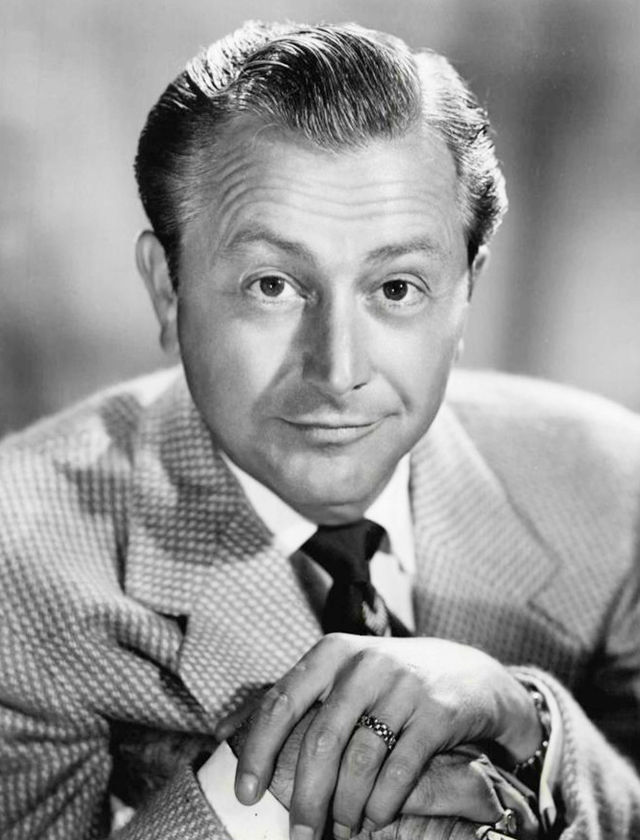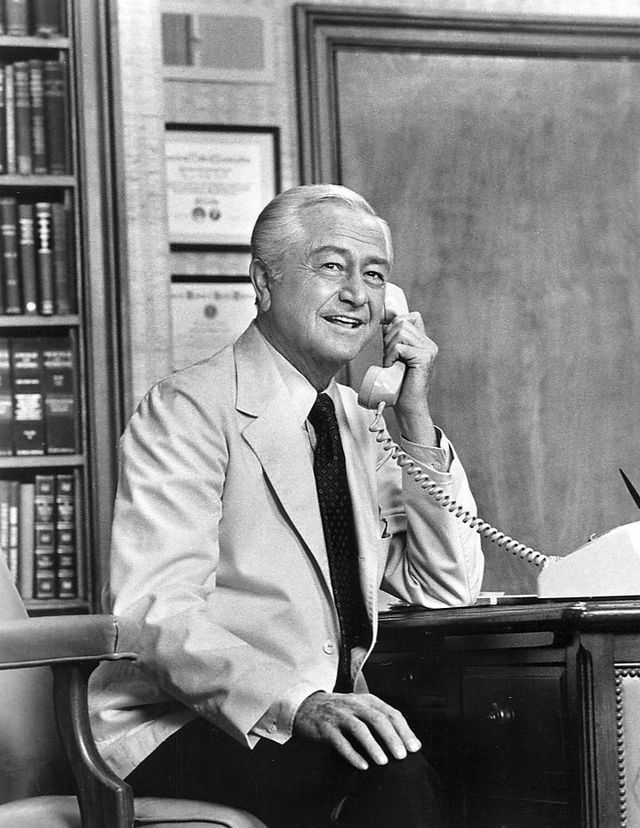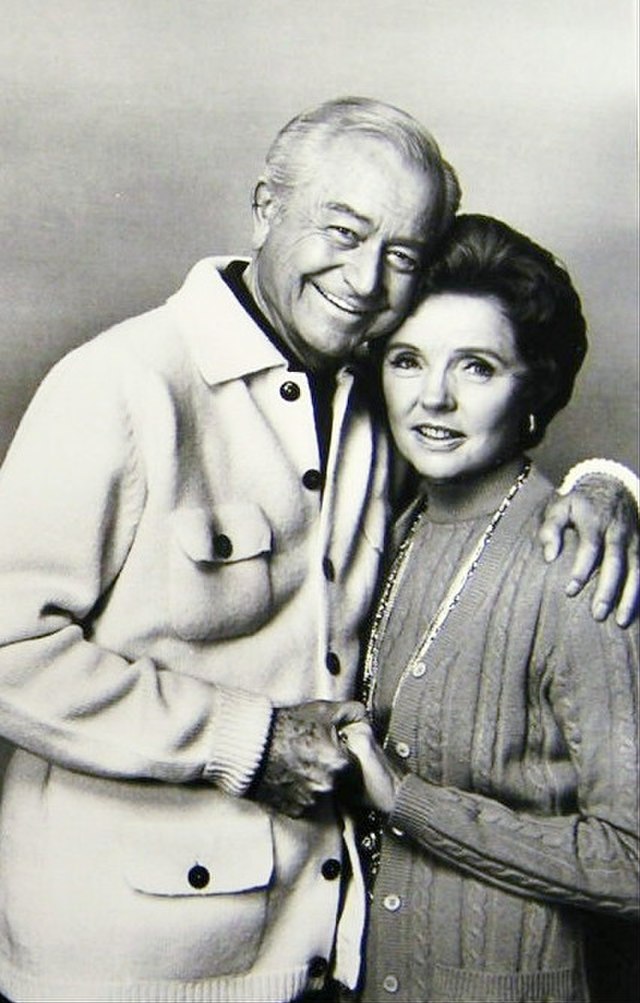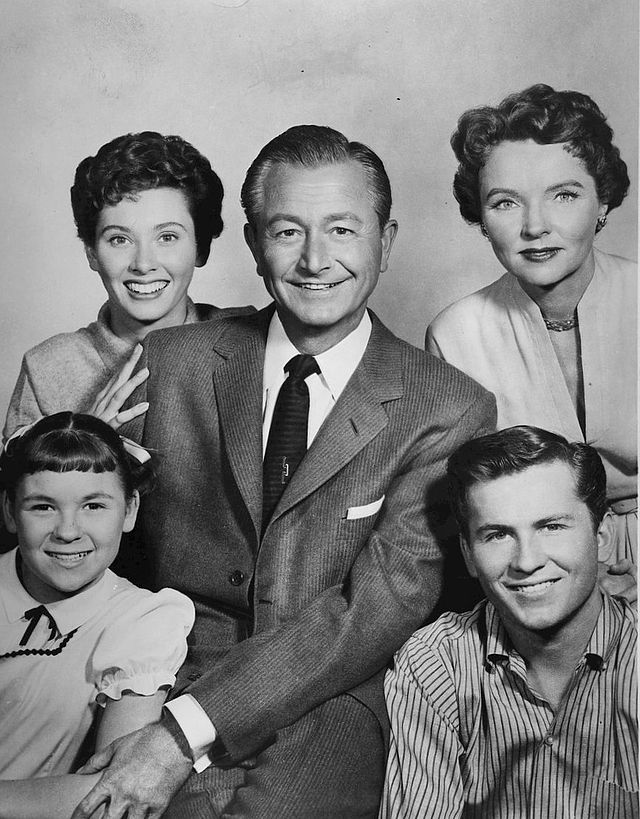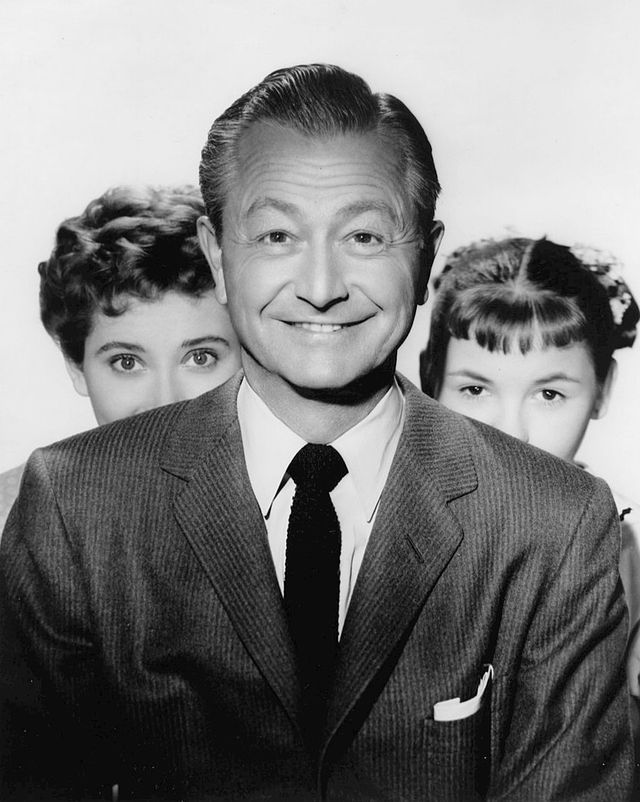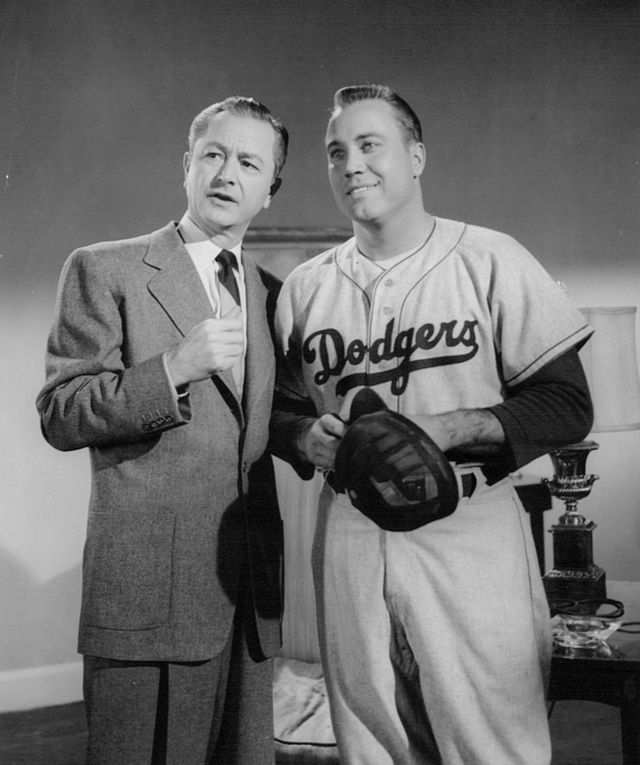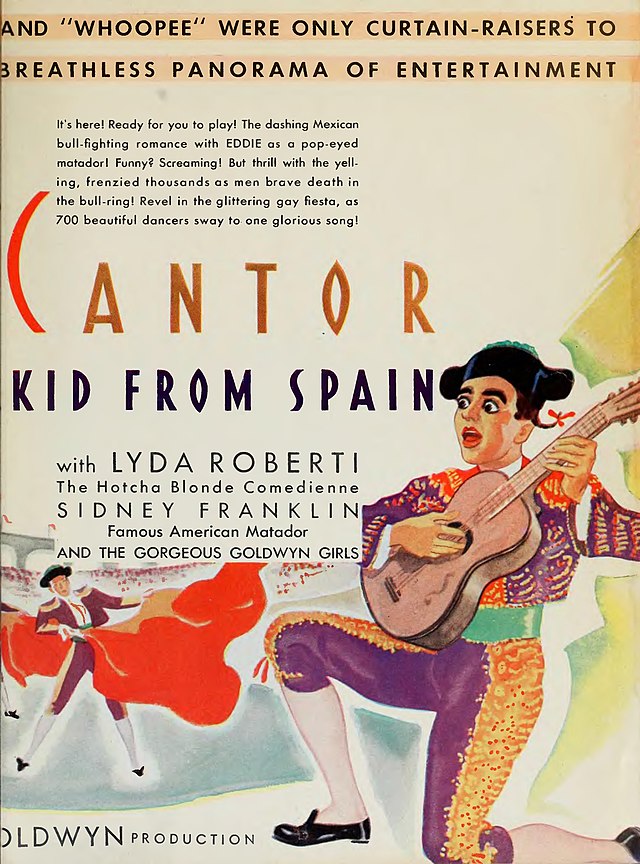Robert Young (1907 – 1998)
Biography and Movie Career
Robert George Young was born on February 22, 1907, in Chicago, Illinois. He was the third of five children born to Irish immigrant parents. Young’s early years were marked by financial difficulties, and his family relocated several times during his childhood. They eventually settled in Los Angeles, California, where Young attended Abraham Lincoln High School. It was there that he developed an interest in acting, participating in school plays. After graduating, Young briefly attended the University of Southern California, where he studied drama.
Path Toward Success
Young’s introduction to the entertainment industry came through odd jobs at the studios, including a stint as a sound technician. His big break occurred when he was discovered by a talent scout while performing in a play at the Pasadena Playhouse. This led to a contract with Metro-Goldwyn-Mayer (MGM) in the early 1930s. Young quickly established himself as a dependable actor, often cast as the affable, clean-cut leading man in romantic comedies and dramas.
His career flourished during the 1930s and 1940s, with roles in films such as The Sin of Madelon Claudet (1931), Journey for Margaret (1942), and The Enchanted Cottage (1945). In 1947, Young received critical acclaim for his role in the film noir Crossfire, where he played a world-weary detective investigating a hate crime. The performance showcased his versatility and marked a departure from his usual roles.
Personal Life and Marriages
Young married Betty Henderson in 1933. The couple shared a long and stable marriage, lasting over 60 years until Betty’s death in 1994. Together, they had four daughters: Carol, Barbara, Kathy, and Betty Lou. Despite his professional success, Young’s personal life was not without challenges. He struggled with depression and alcoholism, particularly during the 1950s, when his film career began to wane.
Transition to Television
In the 1950s, as Hollywood shifted its focus to younger stars, Young found a second career on television. He starred in the hit series Father Knows Best (1954–1960), playing Jim Anderson, the quintessential American dad. The role earned him widespread recognition and several Emmy Awards. In the 1960s, he followed this success with Marcus Welby, M.D. (1969–1976), where he portrayed a compassionate family doctor. This role earned him further acclaim and cemented his legacy as one of television’s most beloved stars.
Passions and Interests
Outside of acting, Young had a deep interest in woodworking and gardening, finding solace in these hobbies during difficult times. He was also an advocate for mental health awareness, drawing from his own experiences with depression. Later in life, he became a spokesperson for the National Mental Health Association.
Later Years and Death
In his later years, Young withdrew from the public eye, preferring to spend time with his family. He faced ongoing health issues, including a heart condition. On July 21, 1998, Robert Young passed away at the age of 91 at his home in Westlake Village, California. The official cause of death was respiratory failure, exacerbated by heart problems.
Legacy
Robert Young is remembered as a versatile actor who transitioned seamlessly from film to television. His portrayals of warm, dependable characters resonated with audiences, making him a household name for generations. Despite personal struggles, his commitment to his craft and his advocacy for mental health leave a lasting legacy in Hollywood and beyond.
Robert Young’s Physical Measurements
• Height: Approximately 6 feet (183 cm)
• Weight: Around 170 lbs (77 kg) during his peak career years
• Build: Lean and athletic
• Hair Color: Dark brown (grayed later in life)
• Eye Color: Blue
Video on Robert Young
Analysis of Robert Young's Acting Style
Robert Young was celebrated for his naturalistic and understated approach to acting, a style that resonated deeply with audiences across multiple generations. His performances were characterized by warmth, relatability, and an ability to embody everyday characters with subtlety and emotional depth.
Authenticity and Relatability
Young’s acting style emphasized authenticity. Whether he was playing a suburban father in Father Knows Best, a detective in Crossfire, or a compassionate doctor in Marcus Welby, M.D., he brought a sense of genuineness to his roles. He often portrayed characters who were grounded, approachable, and inherently good, making him a comforting presence on screen. His ability to deliver lines with sincerity, without overacting, endeared him to audiences who saw him as an extension of their own lives.
Versatility Across Genres
Though he became most famous for his roles in family dramas and television, Young’s early film career showcased his versatility. He seamlessly moved between romantic comedies (The Bride Comes Home), dramas (The Enchanted Cottage), thrillers (Crossfire), and even light-hearted musicals (Josette). His ability to adapt to various genres highlighted his wide range, though his subtlety often stood out most in roles requiring quiet emotional power rather than overt theatricality.
The Art of Subtlety
One of Young’s defining traits was his mastery of subtle, understated acting. Rather than relying on grand gestures or melodramatic expressions, he conveyed emotions through small, meaningful movements—an arched eyebrow, a tilt of the head, or a quiet sigh. His calm demeanor often reflected the steady, reliable characters he portrayed, but it also allowed him to hint at deeper, unspoken emotions beneath the surface.
The Everyman Persona
Young’s acting was rooted in his ability to embody the archetype of the “everyman.” He portrayed ordinary people dealing with everyday struggles, giving audiences a mirror into their own lives. His characters often navigated moral dilemmas, personal growth, or family dynamics with a blend of humor, tenderness, and quiet strength.
Commanding Emotional Depth
While Young was known for his warmth, he also had the capacity to bring emotional complexity to his roles. In films like The Enchanted Cottage, he delivered a nuanced performance as a war veteran scarred by both physical injuries and emotional trauma. His portrayal of Dr. Marcus Welby also demonstrated his skill in handling sensitive topics with empathy, whether addressing addiction, terminal illness, or generational divides.
Comforting Presence
Perhaps the hallmark of Young’s style was his ability to create a sense of safety and stability for viewers. He exuded a paternal warmth in Father Knows Best and a reassuring professionalism in Marcus Welby, M.D. This quality made him an enduring favorite, particularly during times of societal uncertainty, when audiences sought stability and reassurance in the characters they watched.
Influence and Legacy
Young’s approach to acting was ahead of its time in its emphasis on restraint and realism. In an era when many actors leaned toward theatrical performances, Young’s grounded style paved the way for the naturalistic acting that would dominate later decades. His ability to bring humanity and relatability to even the simplest roles remains a benchmark for actors in both film and television.
In summary, Robert Young’s acting style was defined by its authenticity, emotional subtlety, and ability to connect with audiences. He portrayed characters who felt real, whether they were navigating the complexities of family life, solving mysteries, or offering medical care. His legacy as a beloved everyman and a model of understated acting continues to influence actors today.
Personal Quotes
On Acting and Success:
• "I'm not in the business to be recognized. I'm in it because I love acting."
• "Success is a strange thing. It comes and goes, and if you're lucky, you learn to enjoy the ride without taking it too seriously."
On Family and Life:
• "The best role I ever had was being a father. Everything else was just a rehearsal for that."
• "Life isn’t about perfection; it’s about the love we share and the stories we tell."
On Television’s Impact:
• "Television gives you a chance to connect with people in their homes. It’s a privilege and a responsibility."
• "People think they know you because of what they see on the screen. What they don't realize is, I learn more from them than they do from me."
On Challenges and Mental Health:
• "We all have our struggles, but talking about them is the first step toward healing."
• "Depression is a thief that takes your joy, but it’s also a reminder to cherish every moment when the light breaks through."
On Longevity in Hollywood:
• "Staying in this business requires more than talent—it takes resilience, humility, and a sense of humor."
• "I've been lucky to play roles that people remember, but I always try to keep in mind that I’m just a man doing a job."
What Others said about Robert Young
Robert Young was widely admired by his peers, collaborators, and audiences alike. Those who worked with him or knew him personally often spoke about his professionalism, kindness, and the warmth he brought both on and off the screen. Here’s what others had to say about him:
Peers and Collaborators:
• Jane Wyatt (Co-star in Father Knows Best):
"Robert was the epitome of grace and generosity. He made every scene feel effortless and had a way of putting everyone at ease. He truly was the 'father' figure, not just on the show, but on the set as well."
• James Brolin (Co-star in Marcus Welby, M.D.):
"Working with Robert Young was like attending a master class in acting and professionalism. He was disciplined, thoughtful, and incredibly kind. I learned so much just by watching him."
• Loretta Young (Frequent Co-star):
"Robert had a rare ability to make any role believable. He brought authenticity to every character he played, and his humility was one of his most endearing traits."
Directors and Producers:
• Norman Lear (Television Producer):
"Robert Young brought credibility and heart to television when the medium was still finding its voice. He made audiences feel like they were part of his family, whether he was playing a doctor or a father."
• Fred Zinnemann (Director of The Seventh Cross):
"Robert was a consummate professional. He brought a quiet strength to his performances that could convey so much with so little."
Critics and Biographers:
• Leonard Maltin (Film Critic):
"Robert Young’s charm and warmth defined an era of television. He represented a kind of steadfast decency that audiences found immensely comforting."
• David Thomson (Film Historian):
"Young was a subtle and often underrated actor. He brought an emotional depth to his roles that was particularly striking in films like The Enchanted Cottage and Crossfire."
General Impressions:
• His Reputation:
Young was often described as a “gentleman” in Hollywood. He avoided the scandals and controversies that plagued many of his contemporaries, instead building a reputation for reliability and integrity.
• Impact on Audiences:
Fans frequently commented on his ability to create a sense of warmth and relatability. Many who grew up watching Father Knows Best or Marcus Welby, M.D. felt as though he was part of their own families.
Legacy Statements:
• Ronald Reagan (Actor and President):
"Robert Young represented everything good about Hollywood during its golden years—talent, dignity, and a commitment to his craft."
• Mental Health Advocates:
After Young opened up about his struggles with depression later in life, mental health advocates praised him for his courage and his role in breaking stigmas surrounding mental health.
Awards and Recognition
Primetime Emmy Awards:
• Wins:
o 1957: Best Continuing Performance by an Actor for "Father Knows Best."
o 1958: Best Continuing Performance by an Actor in a Leading Role in a Dramatic or Comedy Series for "Father Knows Best."
o 1970: Outstanding Continued Performance by an Actor in a Leading Role in a Dramatic Series for "Marcus Welby, M.D."
• Nominations:
o 1956: Best Actor – Continuing Performance for "Father Knows Best."
o 1959: Best Actor in a Leading Role (Continuing Character) in a Comedy Series for "Father Knows Best."
o 1971: Outstanding Continued Performance by an Actor in a Leading Role in a Dramatic Series for "Marcus Welby, M.D."
o 1971: Outstanding Performance by an Actor in a Supporting Role in Drama for "Vanished."
o 1972: Outstanding Continued Performance by an Actor in a Leading Role in a Dramatic Series for "Marcus Welby, M.D."
Golden Globe Awards:
• Wins:
o 1972: Best TV Actor – Drama for "Marcus Welby, M.D."
• Nominations:
o 1970: Best TV Actor – Drama for "Marcus Welby, M.D."
o 1971: Best TV Actor – Drama for "Marcus Welby, M.D."
o 1973: Best TV Actor – Drama for "Marcus Welby, M.D."
o 1974: Best TV Actor – Drama for "Marcus Welby, M.D."
Hollywood Walk of Fame:
• In 1960, Robert Young was honored with three stars on the Hollywood Walk of Fame, recognizing his contributions to:
o Motion Pictures: Located at 6933 Hollywood Blvd.
o Television: Located at 6358 Hollywood Blvd.
o Radio: Located at 1660 Vine Street.
Movies with Robert Young
1931:
• The Black Camel: Young portrays Jimmy Bradshaw in this Charlie Chan mystery set in Hawaii, where a Hollywood actress's murder is investigated.
• The Sin of Madelon Claudet: He plays Dr. Lawrence Claudet, the supportive son of the protagonist, Madelon Claudet, whose life is marked by personal sacrifices.
1932:
• The Wet Parade: Young appears as Kip Tarleton in this drama highlighting the effects of alcoholism on two families.
• New Morals for Old: He portrays Ralph Thomas, a young man challenging traditional family values in pursuit of modern ideals.
• Unashamed: Young plays Dick Ogden, who stands by his sister during a scandalous trial.
• Strange Interlude: He appears as a young Gordon Evans in this complex tale of love and deception.
• The Kid from Spain: Young takes on the role of Ricardo in this musical comedy about an American student mistaken for a bullfighter.
1933:
• Men Must Fight: Young portrays Lt. Geoffrey Aiken in this futuristic drama predicting a second world war.
• Today We Live: He plays Claude, entangled in a love triangle during World War I.
• Hell Below: Young is Lt. Ed "Brick" Walters in this submarine warfare drama.
• Tugboat Annie: He appears as Alec Brennan, the son of a tugboat captain dealing with family and romantic challenges.
• Saturday's Millions: Young portrays Jim Fowler, a college football star facing personal dilemmas.
• The Right to Romance: He plays Bobby Preble, involved in a romantic entanglement with a plastic surgeon.
1934:
• Carolina: Young is Will Connelly in this Southern family drama.
• Spitfire: He portrays John Stafford, an engineer who becomes involved with a mysterious mountain girl.
• The House of Rothschild: Young plays Capt. Fitzroy, involved in the historical narrative of the Rothschild banking family.
• Lazy River: He appears as Bill Drexel, aiding a family struggling against a corrupt businessman.
• Whom the Gods Destroy: Young is Jack Forrester, an actor whose career is affected by World War I.
• Paris Interlude: He portrays Pat Wells, a journalist entangled in a romantic rivalry in Paris.
• Death on the Diamond: Young plays Larry Kelly, a baseball pitcher investigating mysterious threats.
• The Band Plays On: He appears as Tony Ferrera, a football player facing ethical decisions.
1935:
• West Point of the Air: Young is Little Mike Stone, focusing on the lives of military aviators.
• Vagabond Lady: He portrays Tony Spear, involved in a romantic comedy set in a department store.
• Calm Yourself: Young plays Pat Patton, who starts a business solving others' problems, leading to comedic situations.
• Red Salute: He appears as Jeff, a soldier who becomes romantically involved with a general's rebellious daughter.
• Remember Last Night?: Young is Tony Milburn in this mystery-comedy about a murder investigated by partygoers.
• The Bride Comes Home: He portrays Jack Bristow, competing for the affection of a spirited woman during the Great Depression.
1936:
• Secret Agent: Young plays Robert Marvin in Alfred Hitchcock's spy thriller involving an assassination plot.
• The Bride Walks Out: He is Hugh McKenzie, dealing with marital challenges when his wife decides to work.
• Sworn Enemy: Young portrays Hank Sherman, a lawyer battling organized crime to avenge a friend's death.
• The Longest Night: He appears as Charley Phelps in this crime drama set during a department store robbery.
• Stowaway: Young is Tommy Randall, who befriends a young orphan girl aboard a ship in this musical adventure.
1937:
• Dangerous Number: Young plays Hank Medhill, entangled in a comedic love triangle.
• I Met Him in Paris: He portrays Gene Anders, one of the suitors vying for a fashion designer's affection.
• Married Before Breakfast: Young is Tom Wakefield, whose invention leads to romantic escapades.
• The Emperor's Candlesticks: He plays Grand Duke Peter in this espionage tale involving stolen candlesticks.
• The Bride Wore Red: Young portrays Rudi Pal, involved in a social experiment about identity and class.
• Navy Blue and Gold: He appears as Roger Ash, a naval academy student facing personal and athletic challenges.
1938:
• Paradise for Three: Young is Fritz Hagedorn, winning a trip to a luxurious hotel, leading to mistaken identities.
• Three Comrades: He portrays Gottfried Lenz, one of three friends in post-World War I Germany facing love and loss.
• Josette: Young plays Pierre Brassard, involved in comedic misadventures surrounding a nightclub singer.
• Rich Man, Poor Girl: He is Bill Harrison, a wealthy man pretending to be poor to test his fiancée's love.
1939:
• The Story of Alexander Graham Bell:
Young portrays Thomas Watson, Alexander Graham Bell's assistant and collaborator in the invention of the telephone.
• Bridal Suite:
He plays Neil McGill, a wealthy man whose engagement plans are interrupted by a spirited woman he meets in Europe.
• Ninotchka:
Young appears as Count Leon, a diplomat who introduces a stern Soviet envoy to the joys of life and romance in this romantic comedy.
1940:
• Miracles for Sale:
He stars as Michael Morgan, a magician-turned-detective investigating a murder within a mysterious magic circle.
• Florian:
Young portrays Anton, a stable boy who helps a princess escape during the fall of the Austro-Hungarian Empire.
1941:
• Joe Smith, American:
He plays Joe Smith, an everyman whose life is upended when he becomes entangled in espionage during World War II.
1942:
• Journey for Margaret:
Young stars as John Davis, a war correspondent who adopts two orphaned children in war-torn London.
1943:
• Claudia:
He plays David Naughton, a patient husband dealing with his childlike wife, Claudia, as she navigates adulthood.
1944:
• Casanova Brown:
Young portrays Casanova Brown, a man caught in comedic confusion over a surprise baby.
1945:
• The Enchanted Cottage:
He stars as Oliver Bradford, a disfigured war veteran whose love story with a shy woman reveals the transformative power of inner beauty.
1947:
• Crossfire:
Young delivers a standout performance as Detective Finlay, investigating a murder rooted in anti-Semitism.
1948:
• Sitting Pretty:
He plays Harry King, a suburban father who hires an unconventional male babysitter, leading to comedic outcomes.
1949:
• Mother Is a Freshman:
Young portrays Richard Michaels, a professor caught in romantic entanglements with a mother and daughter attending college together.
1950s:
Robert Young transitioned primarily to television during the 1950s, where he found immense success in iconic series such as Father Knows Best and Marcus Welby, M.D., while taking on fewer film roles.
TV Shows with Robert Young
Father Knows Best (1954–1960)
• Role: Jim Anderson
• Synopsis: Young starred as the loving and wise patriarch of the Anderson family, set in the fictional town of Springfield. The show became an iconic portrayal of postwar American family life and cemented Young's image as the quintessential father figure.
• Significance: The show earned Robert Young two Emmy Awards for Best Actor and made him a household name.
________________________________________
Window on Main Street (1961–1962)
• Role: Cameron Garrett Brooks
• Synopsis: Young played a writer returning to his small hometown to reconnect with the community and write a book about its people. Each episode revolved around heartwarming stories inspired by the lives of the town's residents.
• Significance: Though less commercially successful than his other work, the series showcased Young's versatility in heartfelt storytelling.
________________________________________
Marcus Welby, M.D. (1969–1976)
• Role: Dr. Marcus Welby
• Synopsis: In this medical drama, Young portrayed a compassionate and unconventional family doctor who often clashed with the more rigid approaches of his younger colleague, Dr. Steven Kiley (played by James Brolin).
• Significance: The show was a massive hit and earned Young an Emmy Award in 1970. It tackled contemporary issues like addiction, mental health, and terminal illness, bringing a humanizing touch to the medical genre.
________________________________________
The Robert Young Show (1956–1957)
• Role: Himself / Host
• Synopsis: This short-lived anthology series featured Young introducing and narrating a variety of dramatic and comedic stories, with an emphasis on moral and uplifting themes.
• Significance: The series was one of Young's early forays into television beyond acting, showcasing his interest in producing meaningful content.
________________________________________
Television Specials and Guest Appearances
Robert Young also appeared in various television specials and made guest appearances on talk shows and variety programs during the 1950s and 1960s, further solidifying his place in popular culture.

